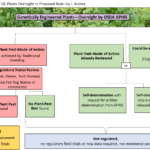
Biotechnology Oversight Gets an Early Make-Over by Trump’s White House and USDA: Part 2 – The USDA-APHIS Rule
Jennifer Kuzma, July 2, 2019 | USDA-APHIS has proposed an oversight process for GE crops that appears to be a significant departure from the current one. This article discusses the features of the proposed new rule, along with its strengths and weaknesses and my recommendations for how it should be amended. ...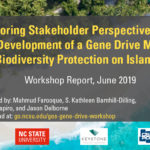
Workshop Report on Gene Drive Mice for Biodiversity Protection on Islands
S. Kathleen Barnhill-Dilling, June 24, 2019 | Mice offer an ideal genetic model for exploring the possibility of developing a synthetic gene drive in mammals. As pests, they pose challenges to human health, agricultural yields and storage, and biodiversity, especially on islands where they are not native. If research on gene drives in mice were to progress to a field trial, an island ecosystem would offer an additional level of physical containment. ...Continue reading "Workshop Report on Gene Drive Mice for Biodiversity Protection on Islands"

Biotechnology Oversight Gets an Early Make-Over by Trump’s White House and USDA: Part 1—The Executive Order
Jennifer Kuzma, June 18, 2019 | Last week, the Trump administration set the tone for its oversight of agricultural biotechnology (ag biotech) through two major actions: 1) Signing the Modernizing the Regulatory Framework for Agricultural Biotechnology Products Executive Order; and 2) Proposing a draft rule on the Movement of Certain Genetically Engineered Organisms (GEOs), changing how USDA reviews GE plants....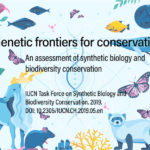
IUCN Report: Genetic frontiers for conservation – An assessment of synthetic biology and biodiversity conservation
Todd Kuiken, May 9, 2019 | Synthetic biology – altering or redesigning genes to meet human objectives – is a fast-developing field with significant potential impacts on nature conservation, according to the Genetic frontiers for conservation assessment report. So far mostly applied in agriculture and medicine, synthetic biology could have substantial knock-on effects on conservation – including modified genes spreading to non-target species and affecting broader ecosystems, but also benefits such as saving threatened species, reduced fertiliser use or diminished demand for products derived from threatened species....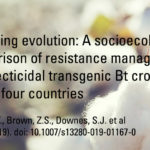
Governing evolution – A socioecological comparison of resistance management for Bt crops
Zachary Brown, March 21, 2019 | Cooperative management of pest susceptibility to transgenic Bacillus thuringiensis (Bt) crops is pursued worldwide in a variety of forms and to varying degrees of success depending on context. We examine this context using a comparative socioecological analysis of resistance management in Australia, Brazil, India, and the United States. We find that a shared understanding of resistance risks among government regulators, growers, and other actors is critical for effective governance. ...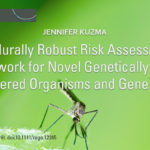
Procedurally Robust Risk Assessment Framework for Novel Genetically Engineered Organisms and Gene Drives
Jennifer Kuzma, March 8, 2019 | This article reviews the current state of gene-editing regulation for crops, illuminating the ways in which technology developers are repeating practices that may lead to the public and ethical failures of the first generation genetically engineered crops, and argues that the contentious socio-political history of genetic engineering will repeat itself for gene editing if these continue....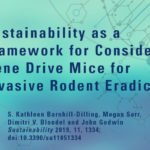
Sustainability as a Framework for Considering Gene Drive Mice for Invasive Rodent Eradication
March 4, 2019 | Sustainability as a Framework for Considering Gene Drive Mice for Invasive Rodent Eradication, by S. Kathleen Barnhill-Dilling, Megan Serr, Dimitri V. Blondel and John Godwin. Abstract: Gene drives represent a dynamic and controversial set of technologies with applications that range from mosquito control to the conservation of biological diversity on islands. Currently, gene drives are being developed in mice that may one day serve as an important tool for reducing invasive rodent pests, a key threat to island biodiversity and economies. ...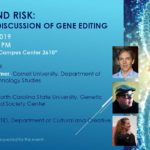
Todd Kuiken Seminar: CRISPR and Risk (RIT)
CRISPR and RISK - A Critical Discussion of Gene Editing; Rochester Institute of Technology, Feb 26, 2019. Speakers: Stephen Hilgartner, Cornell University, Department of Science and Technology Studies; Todd Kuiken, Senior Research Scholar, Genetic Engineering and Society Center North Carolina State University; Patti Durr, RIT/NTID, Department of Cultural and Creative Studies...Continue reading "Todd Kuiken Seminar: CRISPR and Risk (RIT)"
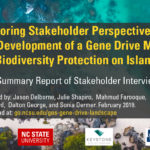
Report: Stakeholder Perspectives on Gene Drive Mice for Biodiversity Protection on Islands
Jason Delborne, February 20, 2019 | This article reviews the current state of gene-editing regulation for crops, illuminating the ways in which technology developers are repeating practices that may lead to the public and ethical failures of the first generation genetically engineered crops, and argues that the contentious socio-political history of genetic engineering will repeat itself for gene editing if these continue....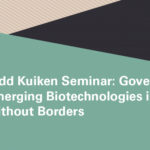
Todd Kuiken Seminar: Governance of Emerging Biotechnologies in a World Without Borders
Innovative Genomics Institute, UC Berkeley, Jan 22, 2019 | Todd Kuiken Seminar: Governance of Emerging Biotechnologies in a World Without Borders. As synthetic biology, genome editing, gene drives, CRISPR, and the biotechnologies of tomorrow continue to emerge, international treaties are struggling to keep pace. While recognizing that biotechnologies are rapidly developing, with potential benefits and potential adverse impacts; how will treaties develop governance systems to both enable benefits while preventing or minimizing adverse effects? How do international treaties that address access and benefits sharing agreements based on “physical genetic material” incorporate (or not) digital sequence information? If engineered gene drives do not recognize a country’s or indigenous community’s sovereign lands; how does the international community address a situation where one country decides to move forward while another, or indigenous community, says no? And how does the International Union for Conservation of Nature, the global authority on the status of the natural world and the measures needed to safeguard it, incorporate (or not), the tools of biotechnology? These are just some of the complicated questions international treaties have been debating over the last 10 years. Join us for a discussion as I examine these and other issues through my personal experiences inside these debates....
GES Colloquium | Khara Grieger – Governance Strategies for Emerging Risks of Solar Radiation Management
GES Colloquium, 2/26/18 - Khara Grieger - Governance Strategies for Emerging Risks of Solar Radiation Management | Decision-makers may soon need to consider other options than mitigation and adaptation to deal with impacts from global climate change. ...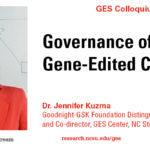
GES Colloquium | Jennifer Kuzma – Regulating Gene-Edited Crops
GES Colloquium, 2/5/18 - Jennifer Kuzma | Crop gene editing emerged just over a decade ago as a promising set of biotechnology techniques designed to more quickly and precisely introduce new or altered genes to change plant characteristics for better growth, product quality, processing, nutrition, or sustainability. Scientists in academia and the ag-biotech industry alike are promoting gene editing, through techniques such as CRISPR-Cas9, as the start of a second biotechnology revolution in agriculture. ...Continue reading "GES Colloquium | Jennifer Kuzma – Regulating Gene-Edited Crops"
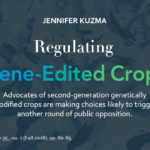
Issues: Regulating Gene-Edited Crops
This article reviews the current state of gene-editing regulation for crops, illuminating the ways in which technology developers are repeating practices that may lead to the public and ethical failures of the first generation genetically engineered crops, and argues that the contentious socio-political history of genetic engineering will repeat itself for gene editing if these continue....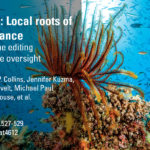
Editing nature: Local roots of global governance
Dr. Jennifer Kuzma, Goodnight-NC GSK Foundation Distinguished Professor and Co-director of the Genetic Engineering and Society Center, was one of the lead authors on an interdisciplinary team calling for global oversight of environmental gene editing in this Science Policy Forum, Editing Nature: Local roots of global governance....Continue reading "Editing nature: Local roots of global governance"
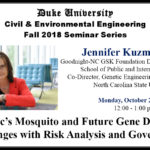
Jennifer Kuzma – Oxitec’s Mosquito and Future Gene Drives (at Duke University)
Duke University Civil & Environmental Engineering | Fall 2018 Seminar Series Oxitec’s Mosquito and Future Gene Drives: Challenges with Risk Analysis and Governance Abstract: In this presentation, I will discuss the current risk assessment and oversight challenges...Continue reading "Jennifer Kuzma – Oxitec’s Mosquito and Future Gene Drives (at Duke University)"